Curated OER
Dusty Locks and the Three Bears
Read this twist on Goldilocks and the Three Bears: Dusty Locks and the Three Bears by Susan Lowell. Kindergartners listen, predict, and discuss the story. They then participate in a dramatization of the story and draw a picture to...
Curated OER
Identifying Text Features of a Self-Written Fable
Make learning the parts of a book fun by having pupils construct their own glossary entries, table of contents, and title page. Beginning with a review of text features and a hunt for examples, kids use previously written fables to...
Curated OER
Text Features of Fiction, Poetry, Drama: Story Matrix
How do novels differ from plays? Explore with your class the text features of fiction and drama by reading The Hidden One: Native American Legend and then performing a reader’s theater script based on the story. Class members create a...
Curated OER
Characters in Live Performance
Your intermediate or advanced thespians choose dramatic scenes to perform in duos, small groups, or solo to demonstrate vocal and physical characterization. Use class time to prepare and rehearse. Detailed rubrics work for peer assessment.
Curated OER
Dramatizing Tam's Slipper
Students investigate the Japanese version of the Cinderella tale. In this fairy tale lesson, students read Tam's Slipper and construct a Venn diagram to compare and contrast the tale with the American version.
K20 LEARN
Criminal Motivations: Irony and Characterization In "The Cask Of Amontillado"
Edgar Allan Poe's short story "The Cask of Amontillado" is a bit of a puzzle. Critics have long debated Montresor's motives for killing Fortunato. Young scholars examine examples of the three types of irony (verbal, dramatic, and...
Curated OER
Isn't It Ironic?
After examining the definitions of situational, dramatic, and verbal irony viewers are presented with a series of situations and asked to label the type of irony each example represents. The photos alone make this slide show worth a look.
Curated OER
How Tragic!
Tenth graders read and study, in-depth, a specific classical tragedy, in this case, Oedipus. They explore strategies from making meaning out of or interpreting texts, as well as strategies for determining how authors create meaning in...
Hawaiʻi State Department of Education
Comparing Themes
The tale of "Lon Po Po" is a Chinese story, very similar to the European tale of "Little Red Riding Hood." Learners make cross cultural comparisons between the two tales, focusing on themes common to both. They review story elements such...
Curated OER
Silas Marner by George Eliot
Mary Anne Evans, better known by her pen name George Eliot, wrote Silas Marner in 1861. While you're compiling materials for your Victorian unit, consider printing off these essay questions to help readers really explore the text. Some...
Curated OER
Analyzing Literary Devices
Eighth graders identify figurative language and poetry in this literary analysis lesson. Using Through the Looking Glass by Lewis Carroll and a YouTube video for "The Walrus and the Carpenter," young readers complete a literary device...
Curated OER
It's All in the Translation
Students compare and contrast translations of Greek literature. In this dramatic literature instructional activity, students read and perform passages from four different translations of Euripides's Hecuba. Students discuss how the...
Curated OER
Identifying and Describing Story Elements
First graders examine how to identify the different elements of a story and how they fit in a definite sequence. The use of comprehension skills is essential to retell the story as desired within the lesson.
Curated OER
So Foul and Fair a Play
Students watch various interpretations of Shakespeare's Macbeth in film. In groups, they examine the setting, characters, music and sequence. They compare and contrast the various films and discuss the differences. They write an essay on...
Curated OER
Comparing Tales through Performance
Young scholars compare and contrast versions of The Three Little Pigs. In this fairy tale lesson, students read 3 versions of the fairy tale and dramatize them in order to analyze the similarities and differences.
Curated OER
The Pied Piper Of Hamelin
Students participate in a lesson that covers the genre of narrative poetry. They examine the elements of a narrative poem while focusing upon the characterization. Students compare and contrast the characters while analyzing their...
Curated OER
Science Fiction
Students write a science fiction story. In this science fiction lesson, students read selections of science fiction and compare them to supernatural stories from the Bible. Students identify themes and discuss elements that are common...
Curated OER
Comparing Characters Across Two Short Stories
Ninth graders listen to a read aloud of two short stories focusing on literary devices. The write about the settings and realism of the stories, and decide each main character handles the conflict he faces with nature.
Curated OER
Literature Study Contracts
Young scholars complete activities with a leveled chapter book. In this literature lesson, students read a novel and complete several graphic organizers and activities as they read. They focus on characters, settings, vocabulary, and plot.
Curated OER
Listening to Poetry: Sounds of the Sonnet
Students investigate how sound influences meaning in poetry by listening to sonnets. They write an analysis after listening to and reading sonnets.
Curated OER
Oliver Twist By Charles Dickens
In this literature worksheet, students respond to 23 short answer and essay questions about Oliver Twist. Students may also link to an online interactive quiz on the novel at the bottom of the page.
Curated OER
The Shakespeare Crowd
Students study the life and times of Shakespeare. They read and analyze one of his plays and use the Internet and videos to gain an understanding of how Shakespeare engaged his audiences, then and still today.
Curated OER
Harriet The Spy
Fourth graders investigate the style of diary writing as its own genre of literature. They read Harriet The Spy in order to have a text for this literature study. Students use the skill of prediction to preview the story, and then...
Curated OER
"Julie of the Wolves"
Fifth graders research life in Alaska and compare life there to their lives in this lesson. They read "Julie of the Wolves." They research through the novel and other reference books facts about the Alaskan climate and geography. They...

























